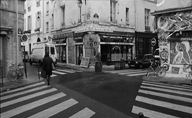Oui Non
 USA, FRANCE, ITALY / 2002 / French, English / Color / Video / 115 min
USA, FRANCE, ITALY / 2002 / French, English / Color / Video / 115 min
Director, Script, Photography, Editing, Sound, Graphics, Manipulation of Music, Producer: Jon Jost
Cast: Helénè Fillieres, James Thierreé
Voiceover: Rita
Source: Jon Jost
331 Lower Hadlock Road, Port Hadlock, Washington 98339 USA
Phone: 1-773-296-4407 E-mail: clarandjon@msn.com
Starting with early twentieth-century Paris as shot by photographer Eugene Atget, this work moves to a contemporary love story between a man and a woman. Jon Jost, director of London Brief and 6 Easy Pieces, has carved out new realms of possibility for digital video by eliminating dialogue and narrative. This shows a new point of departure for Jost, who achieves a never-before seen sensuality in his work as the breaths of the two lovers intertwine.
[Director’s Statement] Oui Non is simultaneously a fictional narrative—a simple boy-meets-girl story—and a critique of the fictional narrative form, which in turn becomes a “documentary.” The falsity of fiction—which reveals things in a certain formalistic manner—collides with the reality of life. Life is a disordered mess. The only narrative certainty is that it will end in death, and fiction would put it into order. As a critique of “fiction,” it also critiques “documentary”—that form in which a maker creates a fictional ordering of “realities,” inherently leading to falsehood while masquerading as a system for revealing “truth.”
Oui Non plays with this and in truth was played with by it, and along the way it pays homage to many things Parisian, including films, literature, philosophy, and the mythos of Parisian romance. It is a romantic comedy which is really a tragedy, a fiction which is a truth.
This film is about how we turn reality into fiction, and create reality from fiction. Most visitors to Paris, a real city, arrive with a preconceived and in many senses fictional map, imprinted by history, politics, and the arts, so that the city seen has already been prescribed, just as the spectator’s preconditioning determines which film they will (or won’t) see.
Oui Non is also about the transition from celluloid film to digital aesthetics, from rigidity to plasticity, from filming with the burden of large costs to making of works almost without cost. It asks the viewer to set aside the habits of a spectator, the expectation and anticipation of “a story,” and instead to simply look and observe as in life. And to question.
For the maker it is very much a transitional work, a step from one place to another. It is a farewell to film.
 Jon Jost
Jon JostBorn in 1943 in Chicago to a military family, Jost grew up in Georgia, Kansas, Japan, Italy, Germany and Virginia. Expelled from college in 1963 and began making 16mm films. Has made some twenty shorts and thirteen feature-length films, all of which he conceived, wrote, photographed, directed and edited. Imprisoned by U.S. federal authorities in 1965 for two years and three months for refusal to cooperate with the Selective Service System. On release, became engaged in political activities and worked for the draft resistance, and helped start the Chicago branch of what became Newsreel and the New Left film production and distribution group. Made his first feature-length film in 1974, and has since devoted himself to making a wide-ranging series of films, largely focused on specifically American topics, including essays, essay-fictions, avant-garde and new narrative forms. His work has shown widely in museums, film archives and festivals since 1975. Plain Talk & Common Sense (Uncommon Senses) (1987), London Brief (1997), and 6 Easy Pieces (2000, Runner-up Prize) were screened at YIDFF ’89, ’97 and ’01 respectively. |
